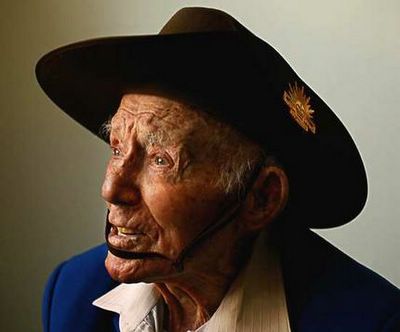Age shall not weary them, nor the years condemn. At the going down of the sun and in the morning, we will remember them.
Peter Casserly, Australia's last survivor of the Western Front in World War I, died yesterday. Aged 107, he was also believed to be Australia's oldest man. And, despite having served on the Somme, his main claim to fame may have been the longevity of his marriage - he and his wife, Monica Casserly, had been married for 80 years and 10 months when she died at 102 last year. "The passing time never changed the loveliness of my wife for me," he recalled recently. "She remained a beautiful blessing throughout our long marriage."
Mr Casserly died in a nursing home in Perth. His family believe he could have lived longer if he had not fallen out of his bed nine days ago. Although frail and virtually blind, Mr Casserly could still recall the day in 1917 he sailed for France, aged 19. As he departed he dropped into the Indian Ocean a bottled note to his mother. She eventually got it, after the bottle washed up in Esperance and was posted back to her home in Fremantle.
Right to the end he was opposed to the war that claimed nearly 61,000 Australians, 48,000 of them on the Western Front. He knew 28 of the men listed as killed in action on the war monument in North Fremantle alone. Although he marched in an Anzac Day parade aged 22, it took another 84 years before he attended his second. He liked to be thought of as one of the last of the World War I veterans, but he never joined the RSL. Yet a map of the Western Front hung on the wall of his nursing home. Until his last years he preferred to talk about his family, work and the East Fremantle Football Club than his 2½ years of army service.
Peter Casserly left school at 13 and worked as a blacksmith's apprentice, then as a fireman on the railways. In France he became a sapper at the infamous battlefields of Ypres, Armentières and Amiens, building and repairing fortifications about two kilometres behind the front line. After leaving the army in 1919 he worked as a labourer, opened a wood yard and then turned his hobby of crayfishing into a career. He had two sons with his wife - Edward, who predeceased him, and Peter jnr.
Peter Casserly jnr said yesterday that his father, who he saw more as a friend, had fallen badly on June 16 and, although he picked up for a few days, he went downhill after that. A state funeral would be held in Fremantle next week, he said. "My father was a plain man and would not have wanted all that fuss."
Peter Casserly leaves seven grandchildren and 11 great-grandchildren. His death leaves one sailor from World War I, W. Evan Allan, 105, of Melbourne, along with John Ross, 105, of Bendigo, who enlisted but never left Australia.
Mr Casserly died in a nursing home in Perth. His family believe he could have lived longer if he had not fallen out of his bed nine days ago. Although frail and virtually blind, Mr Casserly could still recall the day in 1917 he sailed for France, aged 19. As he departed he dropped into the Indian Ocean a bottled note to his mother. She eventually got it, after the bottle washed up in Esperance and was posted back to her home in Fremantle.
Right to the end he was opposed to the war that claimed nearly 61,000 Australians, 48,000 of them on the Western Front. He knew 28 of the men listed as killed in action on the war monument in North Fremantle alone. Although he marched in an Anzac Day parade aged 22, it took another 84 years before he attended his second. He liked to be thought of as one of the last of the World War I veterans, but he never joined the RSL. Yet a map of the Western Front hung on the wall of his nursing home. Until his last years he preferred to talk about his family, work and the East Fremantle Football Club than his 2½ years of army service.
Peter Casserly left school at 13 and worked as a blacksmith's apprentice, then as a fireman on the railways. In France he became a sapper at the infamous battlefields of Ypres, Armentières and Amiens, building and repairing fortifications about two kilometres behind the front line. After leaving the army in 1919 he worked as a labourer, opened a wood yard and then turned his hobby of crayfishing into a career. He had two sons with his wife - Edward, who predeceased him, and Peter jnr.
Peter Casserly jnr said yesterday that his father, who he saw more as a friend, had fallen badly on June 16 and, although he picked up for a few days, he went downhill after that. A state funeral would be held in Fremantle next week, he said. "My father was a plain man and would not have wanted all that fuss."
Peter Casserly leaves seven grandchildren and 11 great-grandchildren. His death leaves one sailor from World War I, W. Evan Allan, 105, of Melbourne, along with John Ross, 105, of Bendigo, who enlisted but never left Australia.
We salute and honour you, Peter Casserly!
GBYAY


<< Home